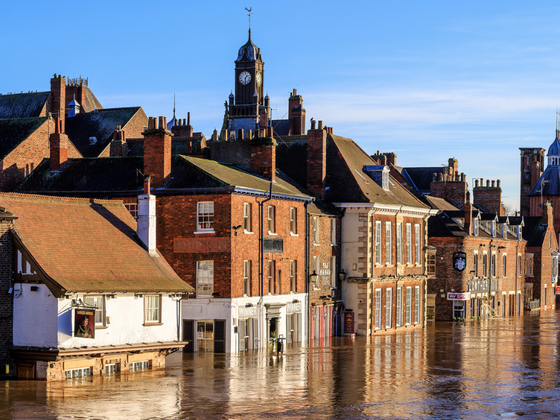Government and business need to do more to prepare for weather-related havoc, says committee

A study by the UK’s independent advisory body Committee on Climate Change (CCC), released as new prime minister Theresa May prepared to take occupancy of 10 Downing Street, said government, business, public services and individuals will need to prepare for the consequences of extreme weather as the world’s climate warms.
“Delaying or failing to take appropriate steps will increase the costs and risks for all UK nations arising from the changing climate,” said Lord Krebs, chairman of the adaptation sub-committee of the committee on climate change, in a statement accompanying the report.
In the CCC’s report, which is an update of previous estimates of adaptation risks, flooding and coastal change is viewed as one of the main climate hazards to households, businesses and infrastructure.
In the past 12 months the UK has endured serious flooding in northern cities, while intense bursts of rainfall have inundated electricity substations and washed away roads and bridges. Such events are expected to become increasingly frequent, raising major questions about how to reduce the impacts and assess the economic risks of climate change.
The report also warns of risks to health, wellbeing and productivity from increasingly frequent high temperatures, and the impact that extreme weather will have on public water supply, and the availability of water for power generation and industry.
Climate change will also have serious consequences for “natural capital”, such as terrestrial, coastal and marine ecosystems, soils and biodiversity.
The report also presents some stark warnings on how climate change will impact populations, economies and livelihoods around the world, which in turn would have big consequences for the UK, which ranked as the world’s fifth-largest economy in 2014.
Among these impacts include loss of life and major humanitarian crises, disruption to agriculture in a world that is experiencing a big increase in population, and interference to supply chains, food prices, international trade and overseas investments
The CCC report cited the example of a US drought in 2012, which contributed to increasing the price of soya which, in turn, led to some UK pig farmers being forced out of business.
“Climate change is expected to increase the frequency of weather extremes, disproportionately affecting low income populations. The UK is likely to be called upon to provide more resources for humanitarian assistance, and efforts to build state stability and long-term resilience could be undermined,” the report said, adding:
“There are uncertain but potentially very significant international risks arising from climate-related human [migration], and the possibility of violent inter-state conflict over scarce natural resources.”
Natural disasters related to climate change, and longer-term trends such as water stress and desertification, could prompt populations to shift and migrate in response. While extremes in climate could also mean that the UK’s overseas aid budget is increasingly used for short-term disaster response rather than long-term development aid, the report continues.
The CCC report said it was too early to tell how the UK’s vote to withdraw from the EU would impact efforts to prepare for the effects of climate change, “The risks don’t change because of Brexit,” said Lord Krebs. However, he added: “Some of the legislation that might underpin our resilience and preparation for future climate changes is EU legislation and therefore there will be a need in due course to replace that with national legislation.”
Concerns have also been expressed by one of the CCC report’s authors that the UK’s withdrawal from the EU will make it harder for the UK to tackle climate change, as the 28-nation bloc (which it will be until the UK exits formally) is often more effective when acts together rather than unilaterally.
courtesy:chinadiakogue
Comments